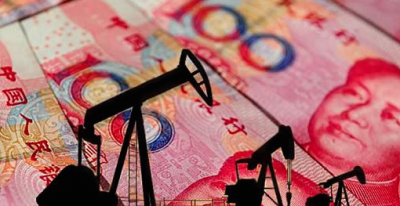New Energy Holding Co-piloted by Russia and China? Oil Dependence in the Next Decade
Russia and China have sealed a stratospheric oil contract, one of the largest in history

Since alternative energies still need huge subsidies to be viable in developing countries, the practice of fracking (kind of universal panacea that will solve the energy problems of humanity), environmental concerns and the inertia of oil assets will not allow large companies to abandon their current equipment and infrastructure, it follows that the world economy will continue to gravitate towards oil dependence in the next decade.
According to the International Energy Agency (IEA), oil production in Russia reached its historic high (11.41 million barrels per day) in 1988 when it was still part of the Soviet Union, but after the decline caused by the economic crisis of 2008, production has been growing to reach 10.59 million barrels per day (bpd) in 2013 with a 20-year expiry date.
Russia and China have sealed a stratospheric oil contract that becomes one of the largest in the history of the energy industry by which the Russian company Rosneft, (the country’s largest oil company), will supply the Asian giant for 25 years with $270 billion.
This, together with the mega gas contract signed by Russia’s Gazprom and China’s CNPC, which will supply 38,000 cubic meters of natural gas to the Asian country for an amount of approximately $400 billion and with a duration of 30 years through the pipeline Sila Sibiri (The Siberian Force), would lay the economic foundations of the Euro-Asian Union that began its work on January 1, 2015 as an economic and military alternative to the US project of creating a Trans-Pacific Partnership (TPP for its acronym in English).
Regarding Venezuela, according to a report by OPEC, crude oil production in the first quarter of 2024 would have risen to almost 900,000 bpd (4.28% increase over 2023) and exports increased by 7.4% to reach 27.6 million barrels. Venezuela has reportedly signed an agreement whereby the Chinese state-owned petro-chemical company Sinopec will invest $14 billion to achieve a daily production of oil in 200,000 barrels per day of crude oil in the Orinoco Oil Strip, (considered the most abundant oil field in the world) and the national hydrocarbon company PDVSA would be in negotiations with Russian Rosneft, Italian Eni and Spanish Repsol to obtain the necessary credits to carry out new projects of crude oil and gas, with which Russia and China would already be “strategic partners of Venezuela”.
In the case of Iraq, the western oil companies’ commitment to a transition towards renewable energy sources would be, being exploited by Chinese and Russian state oil companies such as Lukoil and PetroChina, to acquire a larger portion of oil-related assets in Iraq. Thus, according to the Iraqi Oil Ministry, Inpex (Japan’s main oil company, a key ally of the US) was to sell its 40% stake in Block 10 at the Eridu field, one of the biggest oil discoveries of recent decades and which was taken over by Russian oil company Lukoil.
Likewise, US energy giant ExxonMobil has formally abandoned the West Qurna 1 oil field in southern Iraq, handing over its operations to PetroChina, that it retains a majority stake in one of the world’s largest oil fields. Thus, the West Qurna field would have reserves estimated at over 20 billion barrels and represents about 15 per cent of total Iraqi production estimated at over 4 million barrels per day, what would be a triumph of Chinese foreign policy in its strategy to increase its energy sources as well as a severe setback for the US geopolitical interests.
Iran, with the third largest proven reserves of oil and gas in the world after Saudi Arabia and Iraq, is the destination for 80% of Iranian exports of approximately 3 million barrels per day (3% of world production).
Iranian oil is cheap and of good quality so, according to a report by the Reuters agency of October 2023, China would have saved about 10,000 million dollars in the first nine months of 2023 through record purchases of oil from Iran, Russia and Venezuela, all of which are sold at a discounted price.
However, Iraq and Libya would be immersed in destructive internal processes as a result of the balkanization implemented by the US following its doctrine of ordered chaos, Russia and China would thus be the only powers capable of facilitating the export of petroleum products from Libya, Iraq and Iran.
Consequently, the birth of a new energy holding co-piloted by Russia and China, which would include Venezuela, Malaysia, Angola, Uganda and Mozambique as energy partners and that they would use the petroyuan in commercial transactions and then use them as a source of reserve accumulation and thus gain pre-eminence over the dollar in international financial operations, within the Putin and Xi offensive to end the role of the dollar as a global monetary standard.
*
Click the share button below to email/forward this article to your friends and colleagues. Follow us on Instagram and Twitter and subscribe to our Telegram Channel. Feel free to repost and share widely Global Research articles.
Get Your Free Copy of “Towards a World War III Scenario: The Dangers of Nuclear War”!
Germán Gorraiz López is a political analyst. He is a regular contributor to Global Research.
Featured image is from Twitter via Asia Times

